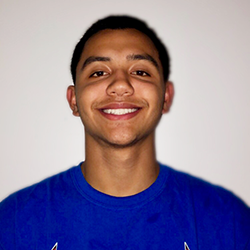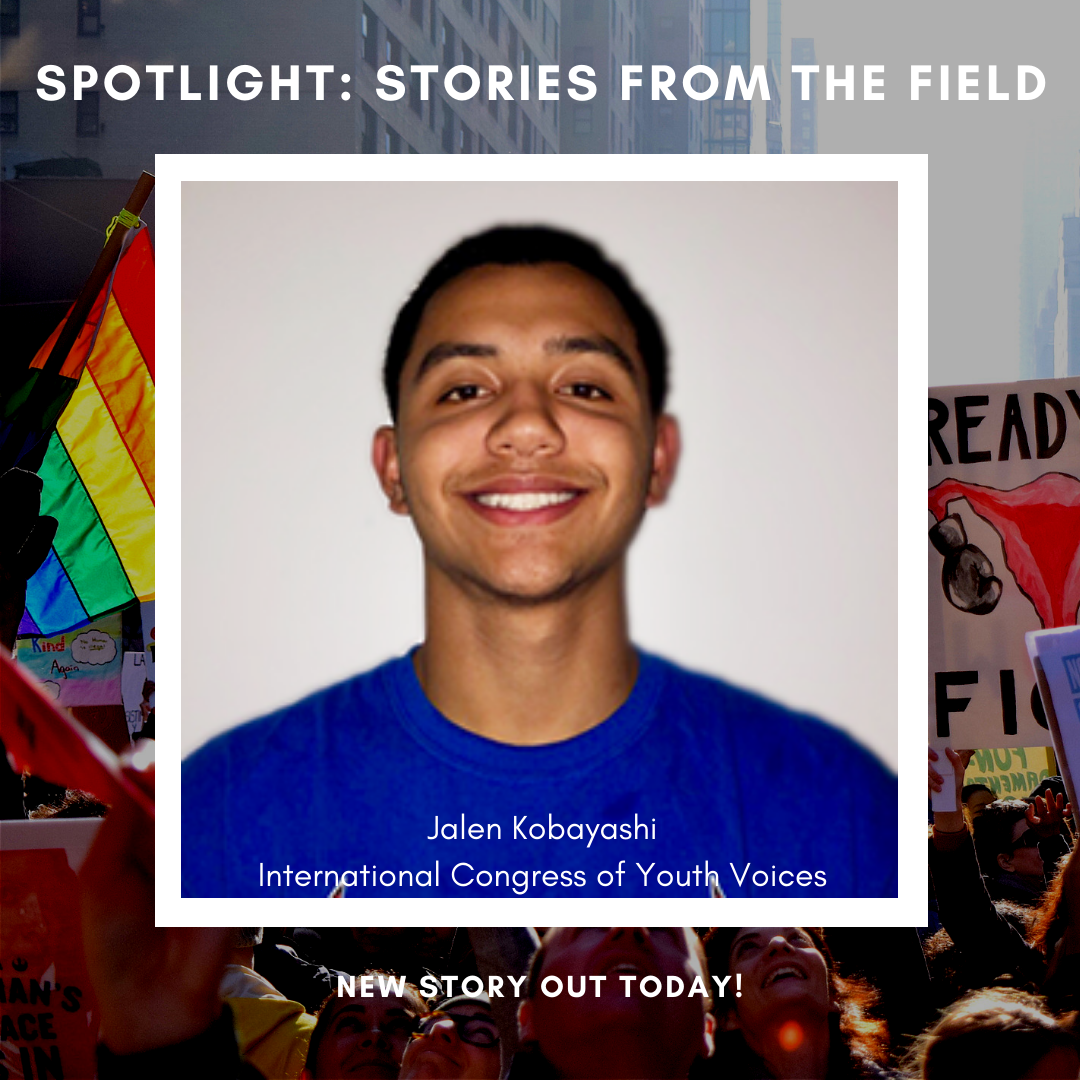
In this month’s Spotlight installment, we bring you a conversation with Jalen Kobayashi, a poet and rapper from Chicago. Jalen uses his art to explore themes that focus on Chicago, the impoverishment and marginalization of minority groups, and social justice. Check out a few highlights from our conversation below!
Tell us a little about your journey – how did you start bringing social justice themes into your writing and rap?

I grew up on the northwest side of Chicago with family all over the city, so I’ve been around Chicago my whole life. When you grow up in Chicago, it’s like the whole world. And when it’s your whole world, you learn that you have to fight for it.
I started noticing pretty young how programs I had access to as a young kid, things like after school programs, art programs, music programs, access to food and free breakfast, started disappearing. The mayor of Chicago and the government of Illinois were taking away our access to resources and programs, they were allowing the education system to deteriorate. Kids coming up through elementary school just two years after me didn’t have the same access that I did. They didn’t have access to the programs keeping kids off the streets from 3-5pm like I did.
Then, when I got into Louder Than a Bomb, the world’s largest youth national poetry competition, my noticing started turning into action. I’ve always written poetry and music, but Louder Than a Bomb taught me how to use my weapon to incite change. Not as a weapon to harm people, but as a weapon to educate and convince people. I learned that my words can help people understand the pain and anguish that my people are going through more than my fists. I can use my writing as an outlet and a medium to help people understand my experiences, that make people feel it. I do a lot of work in schools around Chicago, and standing up and giving a speech in front of a bunch of students does not engage them in the way that a poem or a rap song can. I started to see how I could use my poetry to incite real change.
Everything is everything. So when I started to look more closely at social justice movements like Black Lives Matter, it got me thinking about everything. Gentrification. Redlining. Food deserts. Lack of access and the importance of becoming educated. I started weaving these themes into my writing, but I learned that you can have as much passion and fire in you as you want, but if you aren’t informed on the topics then you can’t speak to them or be understood in the way you want to. There are people who are informed, who will argue with you, and who will try and cut you down. Those are the people I’m trying to change.
What is your earliest memory of activism?
My mom has been a Chicago Public School teacher for her whole career, and, in Chicago, teachers are going on strike almost every season. I was in 6th grade during the 2012 strike, and it was the first time I really got to be a part of it with my mom. I got to see what the power of the people could do.
Then, when I was in 8th grade, I started to get involved with the Black Lives Matter movement. I remember one day, I was outside the Chicago Police Department Headquarters with a megaphone doing a performance – just spitting a poem next to Malcolm London. I couldn’t believe it. I was the youngest person there by far. And it was real rage, real volatile energy I was putting out in that poem. When Trayvon Martin was killed, I was so angry that someone who looked like me was shot down. That day, that poem, was the first time I really understood activism. I understood the importance of being in the streets, of working with grassroots organizers, of connecting with the people who are already doing this work.
Activism comes in many forms. It’s not just about the protest, it’s not just about sharing things online. I knew that day though, that I wanted to make my activism my voice and my writing. People were listening to what I had to say. It was a sublime moment, and it changed the way I thought of my voice. I realized that day that I have a voice and it can be used powerfully.
I realized that my voice can have an effect on people. My voice can make people feel things and change the way they think. And that’s a blessing and a curse, because I have to be conscious about how I use it. The goal, ultimately, is liberation for my people. And when I say my people I mean people of color. Black and brown people. The people of Chicago.
I want to liberate and empower my people through song, through writing, through reading. We aren’t all going to do it the same way, but we are going to keep fighting until we get where we need to go.
Why do you think it’s important to engage young people in this kind of work?
It’s imperative that young people are the leaders of these movements. Young people have always held the stigma of being uneducated. Young means uninformed. Young means immature. Young has always carried these types of connotations to people who are in power. But those connotations are wrong. We do know about these issues. Community issues affect us as soon as we step outside or turn on the news. We feel the impact every moment.
I honestly believe that we are the most socially informed generation of young people this country has ever seen. I’ve never met young people who understand the nuances of race or gender or social dynamics like I do today. I’m going to schools and having conversations about colorism with 3rd, 4th, and 5th graders! So you can’t tell me that just because someone is young they don’t know what they’re talking about.
Young people are human beings. And we deserve to be heard whether you like our opinions or not. We have the tools and the resources we need to incite change from our smart phones and laptops, and we are going to do that. And I know that when people start listening, we’ll see things start to positively change. We want to see equality and accessibility. We want to see enforcement of legislation that is protective of our identities. We’re going to get this right. Young people are the future.
If you could give SLP students and other young activists one piece of advice, what would it be?
I think the first thing I’d say is go out and get involved. NYC is booming with grassroots organizations, activism, protests, and marches. The streets of New York are yours as much as they are anybody else’s. Get involved with organizations and organizers who are working on the issues you care most about. No matter how young you are, you can get involved and make a valid contribution. We don’t need names or the next big activist. What we need are people willing to participate and do the work. No matter how old you are – that can be you.
I’d also say, document and create as much as you can. Art is free and it is supposed to be free. Your art doesn’t have to be on the walls of the MET to have impact. Never stop creating. It’s not about who sees it, it’s about creating for the sake of creating. That’s activism in and of itself. The fact that you are a student of color and you are creating, that in and of itself is resistance.
So, write about everything you see. Document it. Sing it. Paint it. Your story will be told incorrectly if you don’t tell it yourself. Start telling it. And then finally, affirm young people every day. When you see a young person outside, say hi. Tell them they are valid. Tell them they are great. Treat them like they matter. We don’t all hear that every day, but we need to. The world might be telling us that we don’t matter, but we do.
Thank you to the International Congress of Youth Voices for helping SLP to reach Jalen! And thank you Jalen for sharing your story.
The International Congress of Youth Voices unites students, ages 16 to 20, from around the world to learn with and from accomplished writers, activists, and elected officials. Founded by author Dave Eggers (co-founder of 826 National) and nonprofit leader Amanda Uhle, the inaugural event took place August 3, 4, and 5, 2018, in San Francisco. Youth delegates came to us from the United States, Iraq, Sweden, the United Kingdom, Syria, Ireland, Australia, Iceland, Burundi, Honduras, Cuba, Denmark, Venezuela, Zambia, and Nepal.
Politics of the world affect young people as much as anyone else, and they have little to no voice as major decisions are made. The Congress was founded as a means to amplify their ideas and energy and to unite young people for a weekend of collaboration. Student delegates are chosen based on their commitment to leadership and social justice and their passion and eloquence as writers. The event is designed to provide a path to leadership for all delegates and represents a continuum from students who have exhibited potential in local writing and tutoring programs to writers and activists who have already made notable achievements at a very young age.
